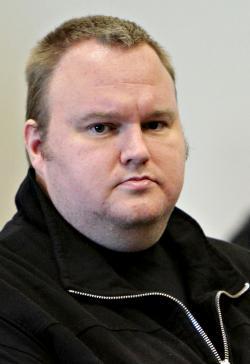Most governments are unwilling to own up to unlawful surveillance. But not in New Zealand. The country’s prime minister this week admitted that one of its spy agencies illegally intercepted Megaupload founder Kim Dotcom’s communications for a full month—prompting an inquiry into how it was allowed to happen.
The development is the latest in a string of blunders related to an attempt to extradite Dotcom to the United States. The 38-year-old millionaire, who was born in Germany, is accused of orchestrating the biggest copyright infringement conspiracy in U.S. history—but authorities have so far handled the case disastrously. Working in collaboration with the FBI, armed police raided Dotcom’s $25 million New Zealand mansion in January. However, a judge later ruled the raid had been authorized using an invalid warrant—rendering the search of Dotcom’s home, and the seizure of his property, “illegal.”
The unlawful surveillance of Dotcom has now compounded the authorities’ embarrassment. A letter published today by Paul Neazor, N.Z.’s inspector general of intelligence and security, discloses how it happened. It reveals that the N.Z. spy agency the Government Communications Security Bureau essentially did not understand the law that is supposed to define whom it can and cannot spy on. GCSB, like the National Security Agency in the United States, is classed as a foreign intelligence agency—and is not supposed to monitor its own citizens or permanent residents. Because Dotcom has resident status in N.Z., he is therefore a “protected person.” But the agency spied on him anyway.
The unprecedented nature of the case, and the pressure on N.Z.’s authorities, may have led to the error. It’s also feasible that the United States played a role. Neazor’s letter notes that U.S. authorities—presumably the FBI—were working with a specialist group of N.Z. police officers. It was this police group that requested the GCSB intercept Dotcom’s communications in order to establish his possible location in the build up to the raid. Could the idea to intercept Dotcom’s communications in advance of the raid have come directly from eager U.S. authorities? It’s certainly a possibility.
In response to the revelation, New Zealand Prime Minister John Key has apologized to Dotcom. Key has also ordered the GCSB to review all cases dating back to 2009. That Key has apologised is commendable, as is his handling of the illegal spying generally. There are few governments in the world willing to candidly publicly acknowledge wrongdoing by their intelligence agencies, especially when it comes to high profile cases. When authorities commit wrongdoing the tendency is often to keep it under wraps in a self-interested bid to protect reputations. In this case, despite knowing it would cause controversy and a storm of negative reaction, N.Z.’s government chose disclosure over secrecy. A rare example of transparency more countries could do well to follow.
